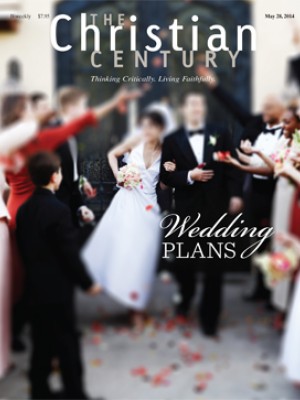Why a church wedding? Truth telling about Christian marriage
Our wedding issue also includes Katherine Willis Pershey on a parishioner who got ordained online, Steve Thorngate on the very liturgical wedding, and Celeste Kennel-Shank on the challenges of interfaith weddings.
Attracting the ire of older church members is never a pleasant experience for a pastor. My friend Matthew found this out when a young woman who had grown up in his church wanted to return to it for her wedding. She and her fiancé agreed to participate in pastoral counseling sessions, but when they met together with the pastor, problems arose. The young woman became uncomfortable when Matthew asked her why she wanted to be married in the church. The young man was candid about not being a believer. As they talked, Matthew learned that the idea of a church marriage was not theirs; the bride’s mother had suggested it.
Read our latest issue or browse back issues.
The couple didn’t object to getting married in her family’s old church; in fact, they found the idea a little romantic. But they weren’t particularly interested in a church wedding as Matthew described it. He told them that he would marry them, but only after more extensive conversations about Christian marriage and Christianity itself: a community shaped by the life, death, and resurrection of Jesus Christ. They were offended and left. Matthew spent the rest of his week dealing with parents, aunts, and church members who could not understand why he’d turn down an opportunity to serve a young couple.
Before considering Matthew’s point of view in this situation, I want to note that I admire this couple’s candor. They could have dissembled, nodding their heads through counseling sessions and paying just enough attention during the service to get their lines right. A lot of couples do that. A lot of couples have little interest in the church’s understanding of marriage or in subsuming their shared life in the church’s life. The young people who came to Matthew were honest enough (if not with the bride’s family) to admit their lack of interest. I believe it would good for both the church and the marrying couples if more couples were honest about their reasons for wanting a “church” wedding.
The truth is that fewer young couples are choosing traditional church weddings. An increasing number of couples choose a small civil ceremony, or a Christian ceremony offsite, or no wedding at all. Many establish a household and a life together without any official civil or religious sanction. These changes in relationships and in commitment decisions feed a growing apprehension that young people are divorcing themselves from the church. If couples are not choosing typical church weddings, doesn’t that indicate the marginalization of the church in these people’s lives and, by extension, in society at large? And so congregations like Matthew’s ask anxiously: Why wouldn’t a pastor unquestioningly embrace a couple asking to be married? Why would a pastor pass up a chance to draw a young couple into the church?
But perhaps that’s the wrong question. Perhaps the question we should be asking is, What does it mean for a couple to get married in the church? One of my seminary professors once recited the nursery rhyme: “Here is the church, and here is the steeple. Open the doors and see all the people.” Then he added, “Of course, it’s only when you open the doors that you see the church. The church is the community.” Viewed in that light, Matthew did not deny the engaged couple a church wedding but instead offered them one.
We need more pastors who are as bold as Matthew and more couples who are as honest as the one that came to him. Most couples, instead of intending to surround their life together with the stories, blessings, and community of the church, ask for a church wedding for other reasons. They feel obligated by tradition. They want a sanctioning of their relationship. They feel pressure from family and friends.
Often couples want only the style: the church contributes a romantic setting and ceremony. Pastor Janet serves a congregation that has a beautiful building just down the street from a large “contemporary” church. Several times a year an engaged couple from the contemporary church stops by to ask if they can be married in her church’s sanctuary. Janet usually says no. She says no because they want only the setting and because their church is opposed to her church’s theology, its theology of marriage, and even to her ordination as a woman. They have no interest in her church as church. And when she says no, they are surprised that “any pastor would do such a thing.”
The honesty of these two pastors is refreshing. It offers a glimpse of a church that is free to claim its identity instead of being taken for granted by the wider society. Matthew and Janet represent a church that’s offering a witness instead of just a service, particularly when the service itself is only an empty introduction to a bigger celebration. In these situations most friends and some family members skip the wedding and show up for the reception. Ministers are asked to simplify the liturgy and shorten their homilies. And while some aspects of the wedding are still cherished—the declaration of intent, the presentation of the bride, the exchanging of vows and rings—others, such as communion, are viewed as irrelevant. If two people are giving themselves to one another as Christ gave himself to the church, however, what could be more relevant than communion?
Stanley Hauerwas says that “Christians are required to love one another—even if they are married. That may be a cruel and even heartless demand,” he says, “but it is nonetheless the way things are if you are a Christian.” Not everyone wishes to make so reckless a commitment, and not everyone is ready to. Because of this, the biggest issue related to fewer church weddings is not the loss of the Christian ceremony, but the loss of Christian community. Pastors miss the opportunity to counsel couples who are beginning the hard work of marriage. Churches miss the opportunity to support couples as they begin a life together, and to have their congregation enriched by the couple’s presence. The couples themselves pass up the opportunity to immerse their fledgling marriage in the rhythms and stories of the household of God.
Many Christians believe that everyone who wants to be married in the church should be granted that request, no questions asked. But another story from Pastor Matthew helps challenge that assumption. Matthew has continued to be upfront with engaged couples, telling them that a wedding performed in the church ought to lead to a marriage that’s lived in the church and shaped by the church’s good news. A second couple, who were moderately active in the life of his congregation, wanted to get married. They agreed to the church’s wedding policy and were open to premarital counseling. But halfway through their counseling sessions, they told Matthew that they had decided to call off their wedding.
Christian marriage, they had come to realize, was not merely dating 2.0. It was not something to do simply because it was what everyone did. It did not promise a lifetime of domestic tranquility and romance. They had come to realize that it was a serious promise, a vow to love their neighbor as themselves even when that neighbor might be an enemy with whom they were sharing a bed. They decided that they needed to discern whether or not they were ready to commit themselves to a Christian marriage. Matthew supported them in this courageous decision and helped them explain it to their families and friends.
A year later the couple returned to him ready to make the commitment, and Matthew noticed that their second engagement with one another—both inside and outside of their counseling sessions—had a depth and a clarity that had been lacking before.
Matthew offers a bold witness, not only because he expects couples married in his church to immerse themselves in church life, but also because he expects those who aren’t interested in doing this to be truthful about it, and he understands that he and the church must respect their truthfulness. His convictions about Christian marriage will probably anger more parishioners and families, but the couples that he counsels are receiving a great gift: the opportunity to have their love for each other shaped by Christ and his love for the church.






